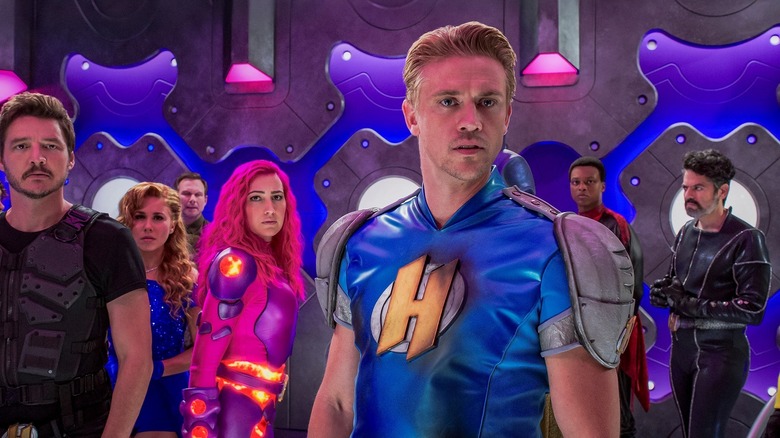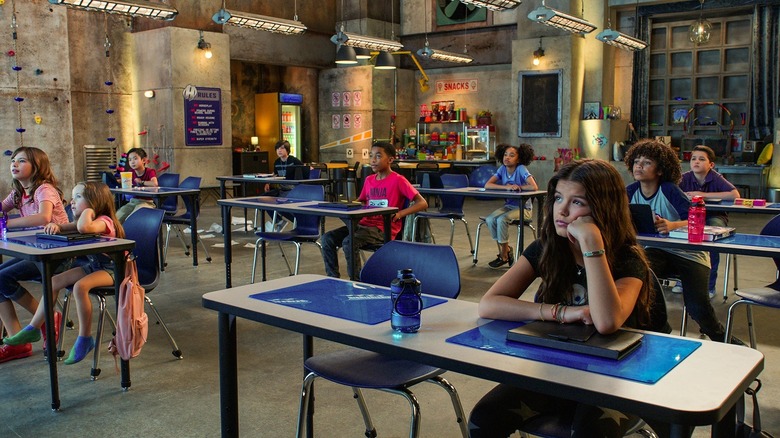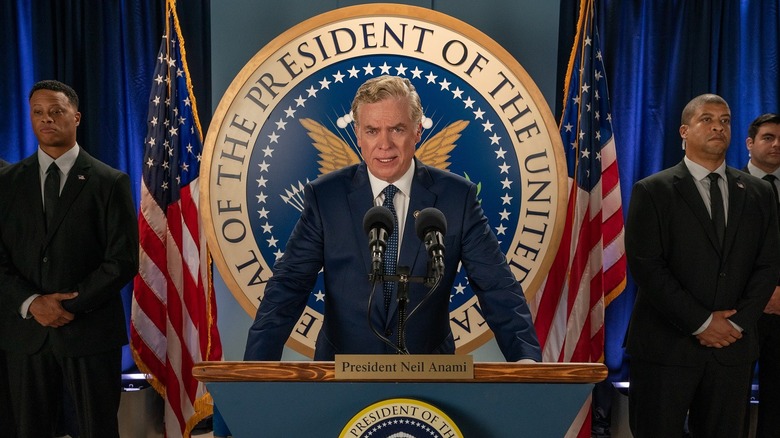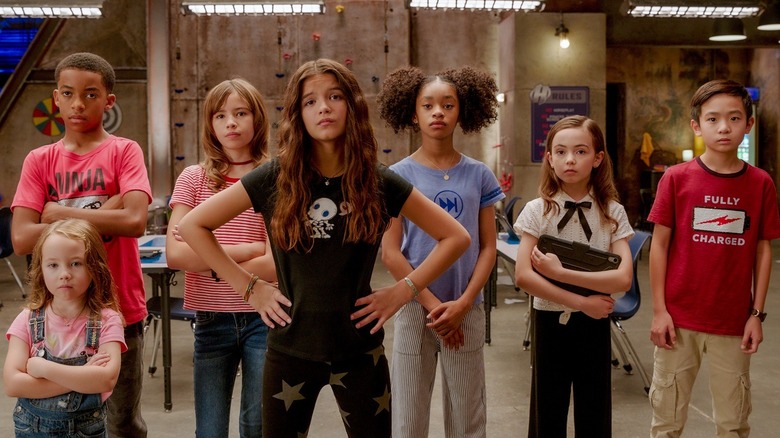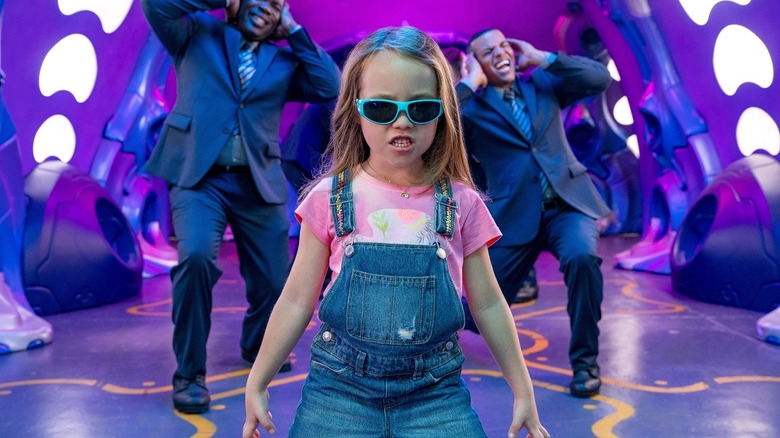Things Only Adults Notice In We Can Be Heroes
This content was paid for by Netflix and created by Looper.
Robert Rodriguez's superhero comedy "We Can Be Heroes" really is fun for the whole family. It centers on an all-new generation of Earth's mightiest heroes, who must step up to save the day after their parents, the world famous Heroics, are kidnapped by invading aliens, leading to an adventure that's a blast for kids and adults alike.
The film is superstar director Robert Rodriguez's follow-up to "The Adventures of Sharkboy and Lavagirl" and was a true labor of love for the writer-director, who teamed up with his real-life children to craft the story. While developing "We Can Be Heroes," Rodriguez was particularly inspired by the opportunity to partner with his growing kids, rather than just parent them, and the story reflects that collaboration in some tender and exciting ways. And even though "We Can Be Heroes" focuses on the kids, there are quite a few details that only adults will notice. Here are just a few.
Generational dysfunction
One thing that's clear from the very beginning is how, as a team, the Heroics are completely dysfunctional. Miracle Guy (Boyd Holbrook) is more interested in taking the perfect selfie than fighting alien invaders. Blinding Fast (Sung Kang) and Crushing Low (Brently Heilbron) don't work well together, thanks to their falling out during the "Crisis of Edinburgh." The mother-father duo Crimson Legend (J. Quinton Johnson) and Red Lightning Fury (Brittany Perry-Russell) can't stop bickering. Sharkboy (J.J. Dashnaw) and Lavagirl (a returning Taylor Dooley) spend so much time apart that their boss, Ms. Granada (Priyanka Chopra Jonas), doesn't even know if they're still married. Marcus Moreno (Pedro Pascal) might be the Heroics' designated leader, but it's clear that the group does not function well as a cohesive unit.
The Heroics' histrionics also have a noticeable impact on their children. Just as Tech-No (Christian Slater) doesn't seem to respect Miracle Guy as the face of the Heroics, his son Wild Card (Nathan Blair) has a hard time accepting Missy as a leader. Meanwhile, twins Rewind (Isaiah Russell-Bailey) and Fast Forward (Akira Akbar) argue even more than their folks. Little Guppy (Vivien Lyra Blair) can't control her shark rage fits, which may mean that her dad's spent too much time selling cereal and not enough time training her. Wild Card also hasn't had enough practice honing considerable talents, and the fathers of both Wheels (Andy Walken) and Slo-Mo (Dylan Henry Lau) don't really appreciate their sons' talents. Worse, just like the Heroics fail to unite in times of crisis, the kids also indulge in petty squabbles until they finally start to learn from their parents' failings.
An entertainment industry
Another element of "We Can Be Heroes" that's bound to resonate with grownups is how the business of Earth-saving is treated as a spectator sport. Not only are the Heroics a commercialized entity that's used to hawk toy clocks and breakfast cereal, but their big battles are coupled with uncomfortably cheery play-by-play commentary by the news anchors.
Before everything goes bad, the broadcasters seem eager to watch a superhero smash-up, despite the fact that the Heroics are up against an extraterrestrial force that could destroy life on Earth as we know it. For the anchors, this is more of a show than a catastrophe — until the Heroics fall, of course. Even then, they ham it up, like they're commenting on a particularly rousing game of football.
This is clearly a play on the real-life criticism that the news has become too entertainment-oriented in recent years. The good news? "We Can Be Heroes" also uses that coverage to deliver some great shots of the fight for those of us in the audience. Hey, it may not be cool to treat a national tragedy like a popcorn moment, but those angles are perfect for moviegoers.
The eye roll-worthy adults
Another element of "We Can Be Heroes" that grown ups should appreciate is how many clever digs the film takes at, well, grown ups. When the kids plan their big escape from the Heroics' HQ, for example, they bank on the adults being utterly predictable and oblivious. This is about more than just perfectly positioning the adults' fall cushions. The kids are savvy enough to walk in single-file lines to keep the adults from noticing their departure! They also manipulate the aliens by pretending to be at odds with one another in order to lure Ms. Granada's goons away from the control room. Most importantly, they know that their warnings about aliens invading HQ, despite being completely true, will be roundly ignored by the adults, and realize it's up to the next generation to do something about it.
Political figures are also directly called out in the film. The mayor is literally named Doolittle, which seems quite fitting after he wastes a mountain of money on a new town hall, only for Crushing Low to smash it to bits after the ribbon-cutting. The children also openly mock the president for his uninspiring response to the Heroics' downfall. "How did this guy end up being President?" Facemaker (Andrew Diaz) says. "He can't even put two sentences together." These kids aren't apathetic. They're just seriously unimpressed.
The superhero snark
"We Can Be Heroes" is brimming with inventively talented superheroes, but the film also seizes on several opportunities to poke a little fun at some of the genre's more groan-worthy traditions. In fact, there's an entire exchange devoted to making light of some of the sillier superhero tropes. As the kids move from their training station to begin their own fight, they discuss how they might be able to avoid the same pitfalls as their parents, and they make an accounting of all of the most unnecessary things about the Heroics — and, by extension, superheroes in general.
First, Missy notes that the new team would be wise to face down foes in more remote locales, saying, "We [could] lure the aliens out of the cities so that we don't destroy more buildings." Rewind echoes her sentiment, saying, "Our parents are always having huge brawls in the middle of the most populated cities." Then, the kids start digging into the wackier aspects of superhero costumes, calling out the pads and the fake abs and the inexplicable over-the-pants underwear trend. Not only does all that look ridiculous and ostentatious, but the kids also note, wisely, that it makes the Heroics pretty easy for enemies to pick out in a crowd.
The takeover
In the end, the overarching message of "We Can Be Heroes" should resonate with audiences of all ages. Kids are the future, and they're smarter and more capable than their parents sometimes give them credit for. From the adults' perspective, the notion that children should have more of a say in the future because it'll be their world to run sooner rather than later is quite powerful.
In the real world, kids who are about the same age as the heroes in this film are facing an ever-changing planet that's going to become even more complex and difficult over time thanks to climate change, an onslaught of new technologies, social media, and so much more. As any grandparent who had their 10-year-old grandchild set up their wi-fi connection knows, kids are more acclimated to these changes than we might think. More importantly, they're also the ones who'll have to face the long-term consequences of all these changes, for better and for worse.
We find out in "We Can Be Heroes" that the alien invaders who'd promised to take over were actually just showing the kids their own power to make change. And in doing so, "We Can Be Heroes" lets the adults watching know that they might need to give a bit more credence to what their kids have to say about their own futures, as well as the world at large.
